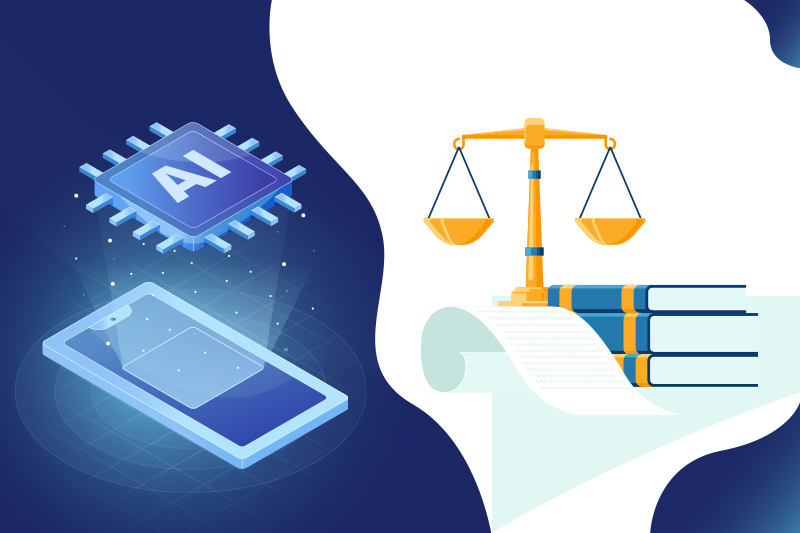Technology has transformed the legal industry and changed the way law firms operate. Along with seamless and efficient litigation support solutions such as document review, eDiscovery, and legal transcription services, both small and big law firms use various technologies to manage their everyday tasks and focus on their core legal activities. As the legal industry continues to evolve at a face pace, artificial intelligence (AI) is playing a hugely transformative role in many aspects of a law firm’s work. Let’s explore how AI applications are useful for law firms.
Key Areas for AI Application in Law Firms
The legal industry generates a huge and ever-increasing amount of data. Digitization is helping law firms free up physical space needed to store large volumes of documents and save time by allowing quick and easy access to files. AI has taken things to the next level by enabling lawyers and paralegals do their jobs better.
There are several areas where AI can be applied in law firms:
- Document review: Lawyers can use the AI software for contract review, due diligence, and e-discovery. AI-powered tools automate the process of document review and quickly analyze large volumes of data. AI software scans a document and immediately breaks it down into searchable information, while identifying critical information, key obligations, and highlighting potential issues for further review.
- Legal research: Two main challenges of legal research are a lack of time and an uncertainty regarding the outcomes. AI-powered platforms can help lawyers complete legal research by quickly identifying relevant case law and statutes, flagging pertinent cases and providing insights into how judgments were pronounced on similar cases in the past.
- Predictive analytics: Predictive analytics (PA) uses algorithms and machine-learning to interpret data to give a complete picture of a situation and predict logical outcomes. PA can identify patterns, abnormalities and correlations in large amounts of data to help lawyers build a case, create a legal strategy, understand opposing counsel strategies, predict case outcomes and make more informed decisions about settlement negotiations and other important legal matters.
- Contract management: Traditional manual contract management is not only time-consuming and laborious but also error prone. Automating contract management processes allows lawyers to focus on substantive work, while saving time. AI-powered contract management tools automate the contract lifecycle, from drafting to review and negotiation to execution and management, improving workflows and team collaboration. Manual contract drafting may cause errors. AI tools proofread the documents, ensure all the relevant details are included, and flag potential risks. AI can help legal professionals maintain regulatory compliance in contract management.
- Compliance monitoring: AI is a driving force in compliance monitoring. The technology quickly reviews long documents, discover information risks within a dataset, and provide meaningful insights from complex data. For instance, if there is a missing document or clause wording which deviates significantly from a certain provisions laid down by the General Data Protection Regulation (GDPR), AI will immediately flag this information so that legal teams can amend it. AI can help law firms monitor and ensure compliance with ever-tightening regulations and legal requirements, including data privacy and security laws.
- Intellectual property management: The area of intellectual property in law involves creating, maintaining, implementing, and enforcing intellectual property rights such as copyrights, patents, trademarks or license. Automation and AI are improving the way law firms manage intellectual property portfolios, including patent search and analysis, trademark monitoring, and IP litigation support.
- Legal transcription: AI-powered technology converts audio/video recordings of depositions, meetings, court proceedings, interviews, and other interactions into word-for-word transcripts in fast turnaround time. AI transcription tools help lawyers in recording keeping and also enable them to keep track of every occurrence and word spoken.
- Client service: By helping lawyers automate mundane tasks, AI helps lawyers save time to focus on their clients and cases and make informed decisions. Law firms can use AI-powered chatbots on their website to provide 24/7 support to clients, book client appointments, and answer visitors’ queries, including basic legal questions and updates on case progress.
The use of AI applications within law firms can improve operational efficiency, increase accuracy in data-intensive tasks, promote informed-decision making, and enhance client service. Lawyers can provide efficient, accurate, and cost-effective services using AI-powered tools which will help them gain a competitive advantage.
It must be kept in mind that despite their many advantages for law firms, AI tools have certain shortfalls:
- The strength of AI depends on the algorithm and data underpinning it, meaning that AI-powered tools can do only what they are programmed to do.
- AI lacks human reasoning and creativity. AI tools are useful for preliminary or low-level review of legal documents. Humans are needed for creative, intellectual analysis which technology cannot replicate, no matter how smart.
- AI poses limitations when it comes to translations of whole documents. A recent study published in the MIT Technology Review determined that, while AI translations work well at the word or sentence level, translations of whole documents still leave much to be desired (www.americanbar.org). The accuracy of human translators was also found to be significantly superior to machines.
- While AI-powered technology can produce legal transcriptions from legal proceedings, to ensure top accuracy, the files need to be reviewed and edited by professional legal transcription service providers.
AI in the Legal Industry – Current State and Future Prospects
Overall, AI has the potential to revolutionize the legal industry by automating many of the tedious and time-consuming tasks that lawyers customarily perform. AI-powered tools can quickly analyze vast amounts of data, scan legal documents for relevant information, and even provide basic legal advice to clients. However, AI cannot replace the human touch in the legal profession as it lacks the judgment, intuition, and empathy that lawyers have. In addition to an understanding of the law, a clear understanding of human behavior, social dynamics, and business realities is necessary for legal analysis and decision-making, which AI may not fully comprehend. As the role of AI in the legal profession continues to evolve, we can expect it to provide solutions to a wide array of challenges that lawyers still face.
We can convert your audio recordings into accurate text quickly. If you use a speech recognition transcription tool, you need to review and proofread your transcripts carefully to ensure accuracy and completeness. Whatever your needs, our experienced team can help!
Contact us (800) 670-2809 today!!




